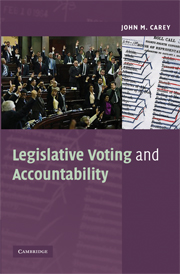Book contents
- Frontmatter
- Contents
- Preface
- 1 TO WHOM ARE LEGISLATORS ACCOUNTABLE?
- 2 COLLECTIVE ACCOUNTABILITY AND ITS DISCONTENTS
- 3 THE SUPPLY OF VISIBLE VOTES
- 4 DEMAND FOR VISIBLE VOTES
- 5 COUNTING VOTES
- 6 EXPLAINING VOTING UNITY
- 7 THE INDIVIDUAL-COLLECTIVE BALANCE
- Appendix: Interview Subjects by Country
- References
- Index
- Titles in the series
6 - EXPLAINING VOTING UNITY
Published online by Cambridge University Press: 05 June 2012
- Frontmatter
- Contents
- Preface
- 1 TO WHOM ARE LEGISLATORS ACCOUNTABLE?
- 2 COLLECTIVE ACCOUNTABILITY AND ITS DISCONTENTS
- 3 THE SUPPLY OF VISIBLE VOTES
- 4 DEMAND FOR VISIBLE VOTES
- 5 COUNTING VOTES
- 6 EXPLAINING VOTING UNITY
- 7 THE INDIVIDUAL-COLLECTIVE BALANCE
- Appendix: Interview Subjects by Country
- References
- Index
- Titles in the series
Summary
Legislative Parties and Institutional Context
The institutional environment in which parties operate is widely held to affect their voting unity. Parties in parliamentary systems are generally characterized as highly unified, and those in presidential systems as more fractious and less disciplined, with resulting difficulty for presidents in the legislative arena (Diermeier and Feddersen 1998; Hix, Noury, and Roland 2006; Persson and Tabellini 2003; Shugart 1998). Federalism, by encouraging the organization of parties at the subnational level, is posited to foster divisions within parties at the national level (Mainwaring 1999; Weyland 1996). Electoral systems that provide for competition among legislative candidates within the same party for personal votes are portrayed as encouraging disunity relative to closed-lists election rules (Ames 1995; Golden and Chang 2001; Hix 2004). The leadership of parties that are older and better established may be more autonomous and less vulnerable to pressure from presidents (Stokes 2001).
These assertions are not uniformly accepted. On the basis of a broad cross-national study, Cheibub, Przeworski, and Saiegh (2004) argue that presidents are on par with parliamentary executives in forming legislative coalitions to pass legislation. After completing a case study of Brazil, a presidential federal system with intraparty electoral competition – all the characteristics listed as undermining party unity – Figueiredo and Limongi (2000) argue that various provisions centralizing control over the legislative agenda provide leverage to control wayward parliamentarians and govern as efficiently as governments that confront none of these institutional obstacles ostensibly do.
Information
- Type
- Chapter
- Information
- Legislative Voting and Accountability , pp. 125 - 164Publisher: Cambridge University PressPrint publication year: 2008
